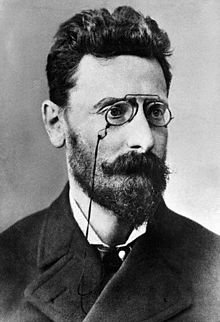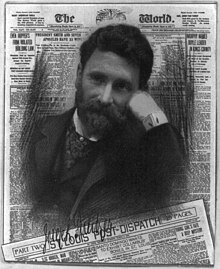Joseph Pulitzer
Joseph Pulitzer , also József Pulitzer (born April 10, 1847 in Makó , Kingdom of Hungary , † October 29, 1911 in Charleston , South Carolina ), was a Hungarian - American journalist , editor and newspaper publisher . He is the founder of the Pulitzer Prize named after him .
Live and act
Youth and Emigration
Joseph Pulitzer was born in 1847 as the eldest son of a wealthy Hungarian-Jewish grain merchant and a strict Catholic German mother in Makó, Hungary, near Szeged . He had a younger brother, Albert, who was being trained for the Catholic priesthood. After the family moved to Budapest , Pulitzer was taught in private schools and by private tutors. At the age of 17 he applied unsuccessfully - classified as unfit - to the Austrian Army , the French Foreign Legion for service in Mexico, and the British Army for service in India. Finally he managed to register for the US Union Army in Hamburg , and in 1864 he reached the USA via Boston ; there he served until the end of the Civil War in the 1st New York Cavalry Regiment, which consisted mainly of Germans. Pulitzer could communicate very well in German and French, but hardly in English. After doing many odd jobs, including as a porter and waiter, he became an American citizen in 1867 . At this point he spoke and wrote excellent English and also had a law degree.
Journalist and publisher
In 1868 he came to St. Louis ( Missouri ) in search of work and was employed by Carl Schurz as a reporter for the German-speaking Western Post . He became editor and co-owner of the newspaper in 1871, which he left in 1873.
After that he was editor of the "Saint-Louis-Globe-Democrate" for several years. He then founded the evening newspaper “Post-Dispatch”, the circulation of which he was able to increase to 40,000 within six months, so that he had to purchase two rotary presses.
In the spring of 1878 he married Kate Davis, a well-known socialite from Washington, in the Protestant Episcopal Church.
After an episode as a correspondent for the New York Sun , he bought the St. Louis Evening Dispatch in 1878 and merged it with the Evening Post to form the St. Louis Post-Dispatch in 1881 . In 1883 he acquired the financially troubled New York World , which under his leadership developed into one of the most important and influential newspapers in the country (with a circulation of 600,000 copies) over the next ten years. In contrast to the competition, it produced sensational articles, meticulously researched reports on corruption in government and business and other grievances and the first (later colored) cartoons . In 1883, Pulitzer succeeded in initiating a large publicity and fundraising campaign for the construction of the base of the Statue of Liberty in the world in order to raise the necessary funds.
In the struggle for ever higher print runs, Pulitzer was personally attacked from 1890 by the editors of the competing newspapers, especially the editor of the New York Sun. His health (he presumably had diabetes ) then deteriorated drastically and in 1890, at the age of 43, he retired as a publisher, almost blind. Nonetheless, he kept strict control over his newspapers and communicated encrypted with his editors. The new color print caused a sensation when, in 1895, a comic strip by the cartoonist Richard F. Outcault appeared in the World , whose main character, a young boy, wore a long yellow shirt. The series The Yellow Kid was named after him - and this comic has coined the term “yellow press”, the sensational press, to this day. In 1887 he hired the investigative journalist Nellie Bly .
In 1895, William Randolph Hearst bought the New York Morning Journal and copied the style of successful reporting from his former mentor Pulitzer. From 1896 to 1898, Pulitzers World was embroiled in an unprecedented campaign with Hearsts Journal . Both newspapers tried to outdo each other in the fight for higher print runs with partly manipulated sensational reports. With their reporting on the Cubans' struggle for independence against the Spanish colonial power, they heated up the mood in the country against Spain to such an extent that Congress finally approved a declaration of war by US President William McKinley after the warship USS Maine on February 16, 1898 for unknown reasons exploded in Havana harbor and killed 260 people.
After the four-month war , Pulitzers World distanced itself from this type of journalism and pursued relentless, well-researched, investigative journalism . This got him and his newspaper in great trouble when he launched the Panama Canal bribery scandal in 1909 . H. uncovered the US President Theodore Roosevelt's payment of US $ 40 million to the French Panama Canal Company. Pulitzer was then sued by Roosevelt and financier JP Morgan . Pulitzer emerged victorious from the defamation process, which he celebrated as the victory of free journalism and made it even more popular.
Politician
In 1869, Pulitzer was elected to the Missouri House of Representatives as a Republican Party member . In the presidential election campaign of 1872 , like many other progressive Republicans, he supported the newspaper publisher Horace Greeley as a candidate against the civil war hero General Ulysses S. Grant . Despite the best efforts of Pulitzer and Schurz, who had become Senator in Missouri in 1868, the 18th US President Grant was elected for a second term. In 1884 Pulitzer was elected to the US House of Representatives.
testament
The New York Philharmonic received a legacy of $ 700,000, but his heirs had unsuccessfully appealed.
In 1892, Pulitzer's donation to found the first journalism school was not accepted. Therefore, in his will from 1904, he decreed that the donated two million dollars should be used to establish a "School of Journalism" and to award a journalist award. It was not until 1912, a year after his death, that the journalism faculty at Columbia University was established, and the Pulitzer Prize has been awarded annually since 1917 .
Quotes
“There is no crime, no trick, no trick, no fraud, no vice that does not live on secrecy. Bring these secrets to light, describe them, make them look ridiculous in front of everyone. And sooner or later public opinion will sweep them away. Just making it known may not be enough - but it is the only means without which all others fail. "
"A message is only a message when the second glance confirms the first glance."
literature
- Katja Behling: trophy of the publicists. The man behind the award. In: Structure . Issue 11, 2008, pp. 15-17.
Web links
- Joseph Pulitzer in the Biographical Directory of the United States Congress (English)
- Joseph Pulitzer in nndb (English)
Individual evidence
- ↑ Little Chronicle . In: New Free Press . Vienna May 21, 1873, p. 6 ( ANNO - AustriaN Newspapers Online [accessed May 27, 2020]).
- ^ A Budapest journalist in America . In: Wiener Allgemeine Zeitung . Vienna November 8, 1884, p. 3 ( ANNO - AustriaN Newspapers Online [accessed May 27, 2020]).
- ↑ Telegrams from the Correspondence Bureau . In: New Free Press . November 6, 1884, p. 7 ( ANNO - AustriaN Newspapers Online [accessed May 27, 2020]).
- ↑ Small messages from here and there . In: Signals for the musical world . No. 49 . Berlin December 13, 1913, p. 1854 ( ANNO - AustriaN Newspapers Online [accessed May 27, 2020]).
| personal data | |
|---|---|
| SURNAME | Pulitzer, Joseph |
| ALTERNATIVE NAMES | Pulitzer, József |
| BRIEF DESCRIPTION | American journalist and editor |
| DATE OF BIRTH | April 10, 1847 |
| PLACE OF BIRTH | Makó , Hungary |
| DATE OF DEATH | October 29, 1911 |
| Place of death | Charleston , South Carolina |




